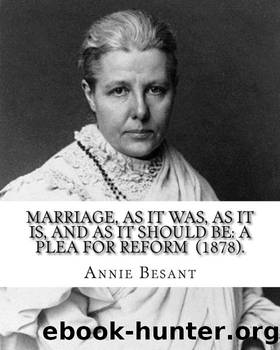Marriage, As It Was, As It Is, and As It Should Be by Annie Besant

Author:Annie Besant [Besant, Annie]
Language: eng
Format: epub
ISBN: 9798689154602
Google: NBw5zgEACAAJ
Publisher: Independently published
Published: 2021-01-28T05:43:42+00:00
* * *
II. DIVORCE.
Any proposed reforms in the marriage laws of England would be extremely imperfect, unless they dealt with the question of divorce. Marriage differs from all ordinary contracts in the extreme difficulty of dissolving itâa difficulty arising from the ecclesiastical character which has been imposed upon it, and from the fact that it has been looked upon as a religious bond instead of as a civil contract. Until the time of the Reformation, marriage was regarded as a sacrament by all Christian people, and it is so regarded by the majority of them up to the present day. When the Reformers advocated divorce, it was considered as part of their general heresy, and as proof of the immoral tendency of their doctrines. Among Roman Catholics the sacramentalâand therefore the indissolubleâcharacter of marriage is still maintained, but among Protestants divorce is admitted, the laws regulating it varying much in different countries.
In Englandâowing to the extreme conservatism of the English in all domestic mattersâthe Protestant view of marriage made its way very slowly. Divorce remained within the jurisdiction of ecclesiastical courts, and these granted only divorces a mensâ et thoro in cases where cruelty or adultery was pleaded as rendering conjugal life impossible. These courts never granted divorces a vinculo matrimonii, which permit eitherâor bothâof the divorced persons to contract a fresh marriage, except in cases where the marriage was annulled as having been void from the beginning; they would only grant a separation "from bed and board," and imposed celibacy on the divorced couple until one of them died, and so set the other free. There was indeed a report drawn up by a commission, under the authority of 3 and 4 Edward VI., c. ii., which was intended as a basis for the re-modelling of the marriage laws, but the death of the king prevented the proposed reform; the ecclesiastical courts remained as they were, and absolute divorce was unattainable. Natural impatience of a law which separated unhappy married people only to impose celibacy on them, caused occasional applications to be made to Parliament for relief, and a few marriages were thus dissolved under exceptional circumstances. In 1701, a bill was obtained, enabling a petitioner to re-marry, and in 1798, Lord Loughborough's "Orders" were passed. By these orders, no petition could be presented to the House, unless an official copy of the proceedings, and of a definitive sentence of divorce, a mensâ et thoro, in the ecclesiastical courts, was delivered on oath at the bar of the House at the same time (Broom's "Comm.," vol. iii. p. 396). After explaining the procedure of the ecclesiastical court, Broom goes on: "A definitive sentence of divorce a mensâ et thoro being thus obtained, the petitioner proceeded to lay his case before the House of Lords in accordance with the Standing Orders before adverted to, and, subject to his proving the case, he obtained a bill divorcing him from the bonds of matrimony, and allowing him to marry again. The provisions of the bill, which was very short, were generally these:â1.
Download
This site does not store any files on its server. We only index and link to content provided by other sites. Please contact the content providers to delete copyright contents if any and email us, we'll remove relevant links or contents immediately.
Should I Stay or Should I Go? by Ramani Durvasula(7652)
The Lost Art of Listening by Michael P. Nichols(7490)
The Rosie Project by Graeme Simsion(6377)
Beartown by Fredrik Backman(5737)
We Need to Talk by Celeste Headlee(5608)
Ego Is the Enemy by Ryan Holiday(5413)
Hunger by Roxane Gay(4921)
Suicide Notes by Michael Thomas Ford(4820)
I Love You But I Don't Trust You by Mira Kirshenbaum(3859)
Mummy Knew by Lisa James(3686)
Not a Diet Book by James Smith(3410)
Crazy Is My Superpower by A.J. Mendez Brooks(3398)
Toxic Parents by Susan Forward(3283)
Girl, Wash Your Face by Rachel Hollis(3282)
The Complete Idiot's Guide to Coping With Difficult People by Arlene Uhl(3145)
The Social Psychology of Inequality by Unknown(3018)
Name Book, The: Over 10,000 Names--Their Meanings, Origins, and Spiritual Significance by Astoria Dorothy(2978)
The Hard Questions by Susan Piver(2967)
The Gaslight Effect by Dr. Robin Stern(2791)
